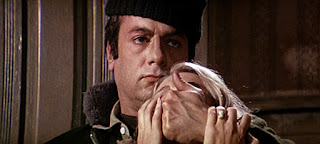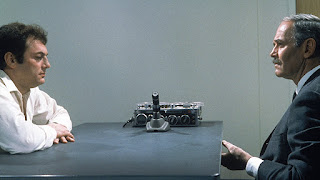Opening text introduces the film as the story of Albert DeSalvo, the self-confessed Boston Strangler. Starting in 1962, an unknown assailant later revealed to be DeSalvo (Tony Curtis) embarks on a murder spree in Boston and the surrounding towns, sexually assaulting and strangling to death single women in their homes. Initially the victims are elderly, but eventually women of all ages are murdered. The killer talks his way into his victims' apartments, avoiding forced entry and leaving no clues.
With the murders gaining national attention, Detective Phil DiNatale (George Kennedy) and Sergeant Frank McAfee (Murray Hamilton) are among the investigators assigned to the case. They interrogate all known violent offenders and sexual perverts, but the murders continue. Assistant Attorney General John Bottomly (Henry Fonda) is appointed to coordinate across jurisdictions, but the killer remains frustratingly elusive.
With DeSalvo's identity revealed from the start and his fate commonly known, The Boston Strangler lacks narrative tension. Edward Anhalt wrote the script as an adaptation of the Gerold Frank book, and director Richard Fleischer uses split screens and a documentary-style grittiness to recreate a few of the murders, the police response, and the public reaction. The film achieves decent engagement more through style than content.The murderer is not fully shown on the screen until about halfway through the film, leaving the generic representations of detectives DiNatale and McAfee as the rather dull main characters for long stretches. With the strangler not making mistakes, Anhalt and Fleischer invest in the arduous work of identifying, tracking down, and interrogating numerous persons of interest. The public is keen to help, and soon phone calls are flooding in about every creepy guy in town.
Perhaps sensing the investigation is floundering, the bookish Bottomly is reluctant to get involved. Henry Fonda is equally rather listless in a hesitant role, meandering from lawyer to detective then psychologist without much explanation. Tony Curtis stretches in a serious role as DeSalvo, an intriguing and not unsuccessful experiment.
Most of the acting showcase moments arrive in a final chapter staged almost entirely in a sparse white hospital room, DeSalvo now a captive and Bottomly eager to get into the mind of a murderer. The drama is stripped down to cerebral levels, lacking excitement but striving for insight.
All Ace Black Movie Blog reviews are here.














No comments:
Post a Comment
We welcome reader comments about this post.